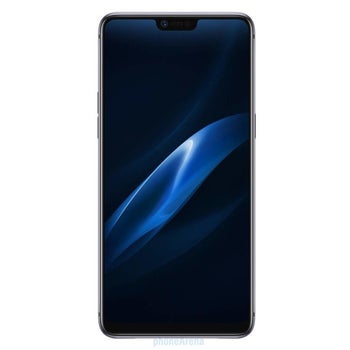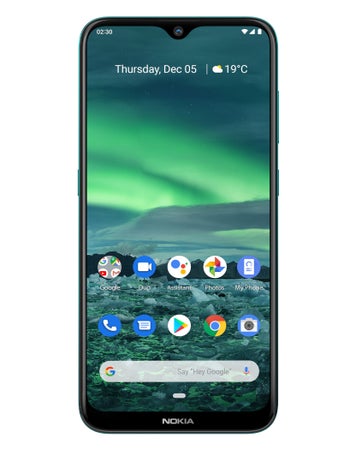OPPO R15 Pro vs Nokia 2.3 Specs Comparison
Compare mobile phone specifications of up to three devices at once. Our specs comparison tool helps you find and compare the perfect phone for your needs.
|
|
|
| OPPO R15 Pro | Nokia 2.3 |
|
Released
·
Jan 09, 2019
|
Released
·
Dec 05, 2019
|
|
6.3-inch · 2280x1080px
|
6.2-inch · 1520x720px
|
|
Dual camera
|
Dual camera
|
|
6GB · 128GB
|
2GB · 32GB
|
|
3430 mAh
|
4000 mAh
|
| Check prices |
Design
| Dimensions | |
|---|---|
| 6.16 x 2.96 x 0.31 inches 156.5 x 75.2 x 8 mm |
6.21 x 2.97 x 0.34 inches 157.69 x 75.41 x 8.68 mm |
| Weight | |
| 6.35 oz (180.0 g) | 6.46 oz (183.0 g) |
| Materials | |
| Back: Ceramic Frame: Aluminum |
Back: Plastic |
| Resistance | |
| Water, Dust; IP67 | |
| Biometrics | |
| Fingerprint (touch) | 2D Face unlock |
| Keys | |
| Left: Volume control; Right: Lock/Unlock key | Right: Volume control, Lock/Unlock key |
| Colors | |
| Purple, Red | Cyan green, Sand, Charcoal |
Display
| Size | |
|---|---|
| 6.3-inch | 6.2-inch |
| Resolution | |
| 2280x1080px, 402 PPI | 1520x720px, 19:9 ratio, 271 PPI |
| Technology | |
| AMOLED | IPS LCD |
| Screen-to-body | |
| 83.68 % | 80.63 % |
| Features | |
| Scratch-resistant glass (Corning Gorilla Glass 5), Ambient light sensor, Proximity sensor | Ambient light sensor, Proximity sensor |
Hardware
| System chip | |
|---|---|
| Qualcomm Snapdragon 660 SDM660 (14 nm) | MediaTek Helio A22 (12 nm) |
| Processor | |
| Octa-core 2200 MHz Kryo 260 |
Quad-core 2000 MHz ARM Cortex-A53 |
| GPU | |
| Adreno 512 | PowerVR GE8300 |
| Memory | |
| 6GB (LPDDR4)/128GB | 2GB/32GB |
| Storage expansion | |
| microSDXC up to 256 GB | microSDXC up to 512 GB |
| OS | |
| Android (8.1 Oreo) | Android (10, 9.0 Pie) |
Battery
| Type | |
|---|---|
| 3430 mAh, Li - Polymer | 4000 mAh |
| Charging | |
| OPPO VOOC | |
Camera
| Rear | |
|---|---|
| Dual camera | Dual camera |
| Main camera | |
| 16 MP (PDAF) Aperture size: F1.7 Focal length: 25 mm Sensor size: 1/2.6" Pixel size: 1.22 μm |
13 MP (Autofocus) Aperture size: F2.2 |
| Second camera | |
| 20 MP Aperture size: F1.7 Focal Length: 25 mm Sensor size: 1/2.8" Pixel size: 1 μm |
2 MP (Depth information) |
| Flash | |
| LED | LED |
| Video recording | |
| 4K UHD (30 fps), 1080p (120 fps), 720p (240 fps) Time-lapse video, Video calling, Video sharing |
1080p |
| Front | |
| 20 MP Video capture: 1080p |
5 MP |
Connectivity & Features
| Bluetooth | |
|---|---|
| 5.0 | 5.0 |
| WLAN | |
| 802.11 a,b,g,n,ac,dual-band Wi-Fi Direct, Hotspot | 802.11 b,g,n Wi-Fi Direct, Hotspot |
| USB | |
| microUSB, USB 2.0 | microUSB, USB 2.0 |
| Location | |
| GPS, A-GPS | GPS, A-GPS, Glonass, BeiDou, Cell ID, Wi-Fi positioning |
| Sensors | |
| Accelerometer, Gyroscope, Compass | Accelerometer |
| Other | |
| NFC, VoIP, Tethering, Computer sync, OTA sync | |
Multimedia
| Headphones | |
|---|---|
| 3.5mm jack | 3.5mm jack |
| Speakers | |
| Earpiece, Loudspeaker | Earpiece, Loudspeaker |
| Features | |
| Album art cover, Background playback | |
| Screen mirroring | |
| Wireless screen share | Wireless screen share |
| Radio | |
| FM | |
| Additional microphone(s) | |
| Noise cancellation | |
Cellular
| 4G (FDD) | |
|---|---|
| Bands 1, 2, 3, 4, 5, 7, 8, 18, 19, 20, 26, 28 | Bands 1, 2, 3, 4, 5, 7, 8, 12, 17, 28, 66(AWS-3) |
| 4G (TDD) | |
| Bands 38, 39, 40, 41 | |
| 3G | |
| Bands 6, 5, 8, 4, 2, 1 | Bands 5, 8, 4, 2, 1 |
| Data Speed | |
| LTE-A Cat 6 (300/50 Mbit/s), HSDPA+ (4G) 42.2 Mbit/s, HSUPA 5.76 Mbit/s | LTE Cat 4 (150/50 Mbit/s), HSDPA+ (4G) 42.2 Mbit/s, HSUPA 5.76 Mbit/s |
| Dual SIM | |
| Yes | |
| SIM type | |
| Nano SIM | Nano SIM |
Buyers information
| In The Box | |
|---|---|
| Earphone, Cable, Power Adapter, Sim Card Ejector, Case | Quick start guide, Safety booklet, Charger, Micro USB cable, SIM tray tool |
Availability
| Officially announced | |
|---|---|
| Jan 09, 2019 | Dec 05, 2019 |
Links
| Full specifications | |
|---|---|
| OPPO R15 Pro Specs | Nokia 2.3 Specs |


